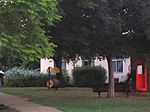Matzuva attack
Islamic Jihad Movement in Palestine attacksMarch 2002 events in AsiaMass murder in 2002Spree shootings in IsraelTerrorist incidents in Israel in 2002 ... and 1 more
Use mdy dates from April 2023
The Matzuva attack was a terrorist attack on March 12, 2002 in which two Islamic Jihad militants who infiltrated Israel from Lebanon opened fire on civilian vehicles traveling on the Shlomi-Matzuva road. Six Israeli civilianswere killed in the attack and one injured.
Excerpt from the Wikipedia article Matzuva attack (License: CC BY-SA 3.0, Authors).Matzuva attack
70, Mate Asher Regional Council
Geographical coordinates (GPS) Address Nearby Places Show on map
Geographical coordinates (GPS)
| Latitude | Longitude |
|---|---|
| N 33.063333333333 ° | E 35.15 ° |
Address
70
2512300 Mate Asher Regional Council
North District, Israel
Open on Google Maps








